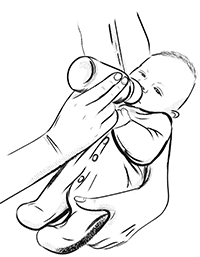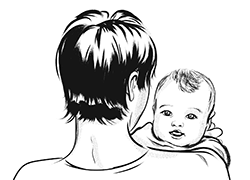Recommendations for feeding your baby
If you have HIV, you may hear a lot of different things about how to feed your baby. Part of the reason you might hear different things is that the feeding recommendations in Canada are not the same as the recommendations in some other countries. This is what is recommended for mothers living with HIV in Canada:
- Feed your baby formula. There is no risk of HIV transmission to your baby after birth with formula feeding. Several free formula programs exist across Canada. These are listed at the end.
- Do not breastfeed your baby. HIV can be passed from an HIV-positive mother to her baby through breast milk. The risk is lower when the mother’s viral load is undetectable, but the risk still exists.

You may have heard that in lower-income countries mothers are advised to take anti-HIV medications and to breastfeed. In these countries, access to clean water and/or affordable formula is not always possible, so the risk of a baby getting very sick with malnutrition or infections (especially diarrhea and pneumonia) from formula feeding is higher than the risk of HIV. Breastfeeding may be the safest option in these countries, even when there is still a small risk of passing on HIV.
Most people in Canada have clean drinking water and can store formula made with water in the fridge or they can get pre-mixed formula that does not need water. This is why formula feeding is recommended. If you cannot get clean water or pre-mixed formula, talk to a trusted healthcare worker or support worker to plan for a supply of formula before your baby is born.
- Do not breastfeed your baby sometimes and other times feed your baby formula or any other breast milk substitute (like cow’s milk)—this is called mixed feeding. Studies show that mixed feeding carries the highest chance of your baby getting HIV.
- Do not chew food in your mouth before you feed it to your baby. If your blood gets in the food, HIV could be passed on to your baby.
- Be open with your HIV care provider and your baby’s care providers about how and what you are feeding your baby. This allows the medical team to give your baby the best care because they have all of the information.
How are recommendations made in Canada?
The recommendations in Canada for mothers living with HIV are based on research studies.

Experts think HIV can hide in breast milk, even when the mother is taking anti-HIV medications.
- Babies have become HIV positive from breast milk even when the mother takes her anti-HIV medications and has a low viral load.
- Experts think that HIV can “hide” in breast milk. (They say that breast milk is an HIV reservoir.) When HIV is hiding, anti-HIV medications cannot find it and treat it. So even when a person’s viral load is undetectable in the blood, HIV can still be in breast milk and it can be passed on to the baby during breastfeeding.
- When mothers are on HIV treatment, anti-HIV medications can be present in breast milk. We do not know a lot about how anti-HIV medications that come through breast milk might impact a baby over time. Some studies show that there are no known concerns. Other studies have shown that for babies who do become HIV positive through breast milk, their HIV might not respond to some anti-HIV medications because of drug resistance. When HIV becomes resistant to anti-HIV medications, those medications will no longer work and the disease can be harder to treat. We need to learn more about this topic.
Even though you may hear that there are benefits to breastfeeding, formula feeding is the safest feeding option for babies born to mothers living with HIV in Canada.
